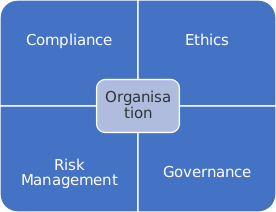The Importance of Ethics, Governance, Risk Management and Compliance (e-GRC) and its integration into the fabrics of an organisation
-
0 Comments
What is Ethics, Governance, Risk Management and Compliance (EGRC)?
Ethics, Governance, Risk Management, and Compliance (EGRC) play a crucial role in ensuring the sustainability, reputation, and success of an organization.

Ethics: Ethics refers to a set of principles, values, and standards that guide behaviour, decision-making, and interactions within a society, organization, or individual. It encompasses concepts of right and wrong, fairness, justice, honesty, integrity, and responsibility. Ethical principles provide a framework for evaluating actions and choices, considering their impact on individuals, communities, and the broader society.

Governance: Governance refers to the processes, structures, and practices through which decisions are made, authority is exercised, and actions are taken within an organization or a community. It encompasses the mechanisms by which organizations, institutions, or societies are directed, controlled, and managed to achieve their objectives while considering the interests of stakeholders.

Risk Management: Risk management is the process of identifying, assessing, prioritizing, and mitigating risks that may impact an organization’s objectives, projects, operations, or assets. It involves systematically analysing potential threats and opportunities, determining their likelihood and potential impact, and developing strategies to manage or capitalize on them effectively.

Compliance: It is about adherence to a command or order which can be contained in laws of the land (mandatory commitments), contracts and agreements or in the organisational policies and procedures (voluntary commitments).
Compliance with laws, regulations, and industry standards reduces legal risks, penalties, and regulatory scrutiny, ensuring business continuity.
Compliance with the internal policies and procedures fosters integrity, trust, and responsible business practices.
Compliance with the voluntary commitments made in the contracts and agreements reduces the risk of contractual disputes, litigation and unnecessary cost.

Integrating EGRC into the Fabrics of the Organisation
EGRC integration promotes a culture of integrity, transparency, accountability, and risk-awareness within the organization, driving sustainable growth, stakeholder confidence, and long-term success. All four are inter-connected and the integration of one without the others will make the organisation fail in achieving Principled Performance – an approach to business that helps organisation achieves its objectives while addressing uncertainties, encashing opportunities, honouring mandatory and voluntary commitments.
However, EGRC is a holistic approach that touches every aspect of an organization and their integration is required into the fabric of organisational operations rather than treating them as separate silos. Integrating EGRC into every function of the organisation establishes a common goal and culture that supports principled performance.
Ethics provides the moral foundation and principles that guide behaviour and decision-making, while governance establishes the structures, processes, and practices that enable organizations to operate effectively, responsibly, and in alignment with ethical standards and stakeholder expectations. Ethics and governance are interconnected aspects of organizational management, with ethics influencing governance practices and governance frameworks supporting ethical behaviour and accountability.
Similarly, risk management and compliance are also complementary to each other. Non-compliance with the mandatory or voluntary commitment is a risk that may result into regulatory fines and prosecution or ethical and governance risk. On the other hand, ineffective risk management can lead to non-compliance.
Integrating EGRC into the fabric of an organization involves several key steps and strategies:
Establish a Clear Framework: Develop a comprehensive EGRC framework that outlines the principles, policies, and procedures governing ethical conduct, governance structures, risk identification and management processes, and compliance requirements.
Leadership Commitment: Ensure strong leadership commitment to EGRC by setting the tone from the top. Leaders should demonstrate a commitment to ethical behaviour, effective governance practices, proactive risk management, and adherence to compliance standards.
Training and Awareness: Provide ongoing training and awareness programs to employees at all levels to enhance their understanding of EGRC principles, responsibilities, and best practices.
Continuous Monitoring and Improvement: Establish mechanisms for continuous monitoring, evaluation, and improvement of EGRC processes and performance. Conduct regular audits, assessments, and reviews to identify areas for enhancement and implement corrective actions as needed.
By adopting these strategies and fostering a culture of integrity, accountability, and responsibility, organizations can successfully integrate ethics, governance, risk management, and compliance into their operations and enhance overall performance and resilience.
